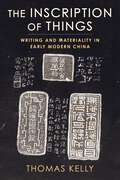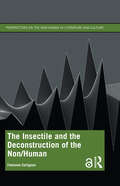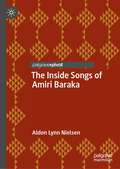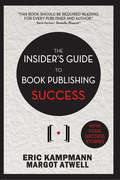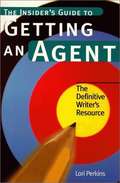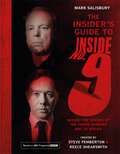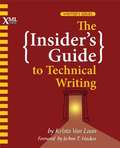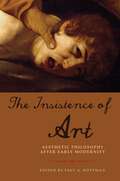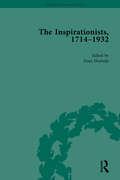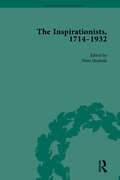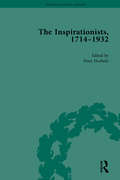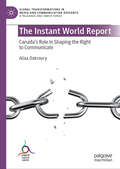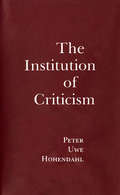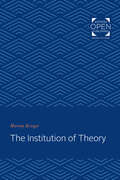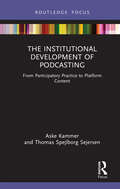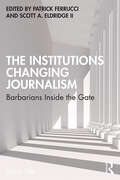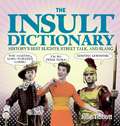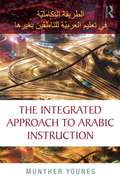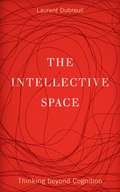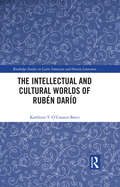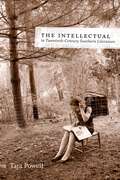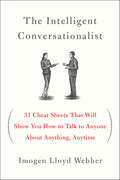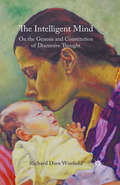- Table View
- List View
The Inscription of Things: Writing and Materiality in Early Modern China
by Thomas KellyWhy would an inkstone have a poem inscribed on it? Early modern Chinese writers did not limit themselves to working with brushes and ink, and their texts were not confined to woodblock-printed books or the boundaries of the paper page. Poets carved lines of verse onto cups, ladles, animal horns, seashells, walking sticks, boxes, fans, daggers, teapots, and musical instruments. Calligraphers left messages on the implements ordinarily used for writing on paper. These inscriptions—terse compositions in verse or epigrammatic prose—relate in complex ways to the objects on which they are written.Thomas Kelly develops a new account of the relationship between Chinese literature and material culture by examining inscribed objects from the late Ming and early to mid-Qing dynasties. He considers how the literary qualities of inscriptions interact with the visual and physical properties of the things that bear them. Kelly argues that inscribing an object became a means for authors to grapple with the materiality and technologies of writing. Facing profound social upheavals, from volatility in the marketplace to the violence of dynastic transition, writers turned to inscriptions to reflect on their investments in and dependence on the permanence of the written word. Shedding new light on cultures of writing in early modern China, The Inscription of Things broadens understandings of the links between the literary and the material.
The Insectile and the Deconstruction of the Non/Human (Perspectives on the Non-Human in Literature and Culture)
by Fabienne CollignonThe Insectile and the Deconstruction of the Non/Human defines, conceptualizes, and evaluates the insectile—pertaining to an entomological fascination—in relation to subject formation. The book is driven by a central dynamic between form and formlessness, further staging an investigation of the phenomenon of fascination using Lacanian psychoanalysis, suggesting that the psychodrama of subject formation plays itself out entomologically. The book’s engagement with the insectile—its enactments, cultural dreamwork, fantasy transformations—‘in-forming’ the so-called human subject undertakes a broader deconstruction of said subject and demonstrates the foundational but occluded role of the insectile in subject formation. It tracks the insectile across the archives of psychoanalysis, seventeenth century still life painting, novels from the nineteenth century to the present day, and post-1970s film. The Insectile and the Deconstruction of the Non/Human will be of interest for scholars, graduate students, and upper-level undergraduates in film studies, visual culture, popular culture, cultural and literary studies, comparative literature, and critical theory, offering the insectile as new category for theoretical thought.
The Inside Songs of Amiri Baraka (Palgrave Studies in Music and Literature)
by Aldon Lynn NielsenThe Inside Songs of Amiri Baraka examines the full length of Baraka’s discography as a poet recording with musicians as well as his contributions to jazz and R & B, beginning with his earliest studio recordings in 1965 and continuing to the last year of his life, 2014. This recorded history traces his evolution from the era of Beat poetry and “projective verse,” through the period of the Black Arts Movement and cultural nationalism, and on to his commitments to “third world Marxism,” which characterized the last decades of his life. The music enfolding Baraka’s recitations ranges from traditional African drumming, to doo wop, rhythm and blues, soul and the avant garde jazz that was his great love and the subject of so much of his writing, and includes both in-studio sessions and live concert performances. This body of work offers a rare opportunity to think about not only jazz/poetry, but the poet in the recording studio and the relations of text to score.
The Insider's Guide to Book Publishing Success
by Eric Kampmann Margot AtwellThe publishing industry is changing rapidly, and there are more options for authors than ever before. Should you find an agent and search for a traditional publishing deal or consider self-publishing? Should you print hardcover copies or opt for an ebook-only launch? Should you hire a publicist? This easy-to-read, nuts-and-bolts guide covers everything from what to look for in? a contract to how many copies to print. Some of the topics covered are choosing a publishing strategy, the editorial process, design, printing, sales and distribution, marketing and publicity.?
The Insider's Guide to Getting an Agent
by Lori PerkinsPerkins delivers all the vital information on how to get the best representation for your work- the latest trends, how to target the right agents, potential of subrights, publicity and foreign sales and when it's time to make writing your day job.
The Insider's Guide to Inside No. 9: Behind the Scenes of the Award Winning BBC TV Series
by Mark SalisburyThe ultimate companion to unlock what lurks Inside No. 9Welcome, reader, to the experience of a lifetime: a behind-the-scenes tour of the remarkable Bafta award-winning series. This show-by-show guide reveals the genesis of each episode's idea through to the scripting, casting, design, direction, and production - where you'll have access to the minds and imaginations of creators Reece Shearsmith and Steve Pemberton.Filled with the show's dark humour and behind-the-scenes photographs, production stills, mood boards and concept drawings, you'll find yourself delighted and disturbed in equal measure. Every episode from the first five series will be covered by interviews with key creatives and discussion of the inspiration and creation behind every moment.Are you ready to step through the door marked No. 9?
The Insider's Guide to Technical Writing
by Krista Van LaanEvery complex product needs to be explained to its users, and technical writers, also known as technical communicators, are the ones who do that job. A growing field, technical writing requires multiple skills, including an understanding of technology, writing ability, and great people skills. Whether you're thinking of becoming a technical writer, just starting out, or you've been working for a while and feel the need to take your skills to the next level, The Insider's Guide to Technical Writing can help you be a successful technical writer and build a satisfying career. Inside the Book Is This Job for Me? What does it take to be a technical writer? Building the Foundation: What skills and tools do you need to get started? The Best Laid Plans: How do you create a schedule that won't make you go crazy? How do you manage different development processes, including Agile methodologies? On the Job: What does it take to walk into a job and be productive right away? The Tech Writer Toolkit: How do you create style guides, indexes, templates and layouts? How do you manage localization and translation and all the other non-writing parts of the job? I Love My Job: How do you handle the ups and downs of being a technical writer? Appendixes: References to websites, books, and other resources to keep you learning. Index
The Insistence of Art: Aesthetic Philosophy after Early Modernity
by Paul A. KottmanPhilosophers working on aesthetics have paid considerable attention to art and artists of the early modern period. Yet early modern artistic practices scarcely figure in recent work on the emergence of aesthetics as a branch of philosophy over the course the eighteenth century. This book addresses that gap, elaborating the extent to which artworks and practices of the fifteenth through the eighteenth centuries were accompanied by an immense range of discussions about the arts and their relation to one another.Rather than take art as a stand-in for or reflection of some other historical event or social phenomenon, this book treats art as a phenomenon in itself. The contributors suggest ways in which artworks and practices of the early modern period make aesthetic experience central to philosophical reflection, while also showing art’s need for philosophy.
The Inspirationists, 1714 - 1932 Vol 3 (American Communal Societies Ser.)
by Peter HoehnleThe Community of True Inspiration, or Inspirationists, was one of the most successful religious communities in the United States. This collection offers a broad variety of Inspirationist texts, almost all of them translated from German and published here for the first time.
The Inspirationists, 1714-1932 Vol 1 (American Communal Societies)
by Peter HoehnleThe Community of True Inspiration, or Inspirationists, was one of the most successful religious communities in the United States. This collection offers a broad variety of Inspirationist texts, almost all of them translated from German and published here for the first time.
The Inspirationists, 1714-1932 Vol 2 (American Communal Societies Ser.)
by Peter HoehnleThe Community of True Inspiration, or Inspirationists, was one of the most successful religious communities in the United States. This collection offers a broad variety of Inspirationist texts, almost all of them translated from German and published here for the first time.
The Instant World Report: Canada's Role in Shaping the Right to Communicate (Global Transformations in Media and Communication Research - A Palgrave and IAMCR Series)
by Aliaa DakrouryThis book proposal focuses on Canada's pioneering role in shaping the international understanding of the right to communicate, particularly through the Canadian Telecommission Studies of 1969. The study argues that the 1971 Instant World report, a landmark document, has been overlooked in the existing literature despite its importance in the history of conceptualizing and implementing this human right. The project aims to fill this gap by exploring the historical context of the report and analyzing its contents, shedding light on themes like privacy and indigenous communication rights. Additionally, the manuscript highlights the unique contribution of Betty Zimmerman, the only female Canadian member of the MacBride Commission in 1977, replacing Marshall McLuhan. Zimmerman's insights become pertinent not only for scholars interested in the New World Information and Communication Order but also for feminist studies, showcasing a leading female figure's role in Canadian communication and cultural policy. The research promises a novel and untold perspective on the history of the right to communicate, addressing gaps in international and Canadian communication, women’s studies, and media policy literature.
The Institution of Criticism
by Peter Uwe HohendahlGerman radicals of the 1960s announced the death of literature. For them, literature both past and present, as well as conventional discussions of literary issues, had lost its meaning. In The Institution of Criticism, Peter Uwe Hohendahl explores the implications of this crisis from a Marxist perspective and attempts to define the tasks and responsibilities of criticism in advanced capitalist societies. Hohendahl takes a close look at the social history of literary criticism in Germany since the eighteenth century. Drawing on the tradition of the Frankfurt School and on Jürgen Habermas’s concept of the public sphere, Hohendahl sheds light on some of the important political and social forces that shape literature and culture. The Institution of Criticism is made up of seven essays originally published in German and a long theoretical introduction written by the author with English-language readers in mind. This book conveys the rich possibilities of the German perspective for those who employ American and French critical techniques and for students of contemporary critical theory.
The Institution of Theory
by Murray KriegerOriginally published in 1994. In The Institution of Theory, Murray Krieger examines, at once sympathetically and critically, the process by which theory has become institutionalized in the American academy and the consequences of theory as an academic institution. He traces the transformation of literary theory into critical theory and relates it to changes in the place of literature within questions about discourse at large. And he faces the costs as well as the gains of the recent denial of privilege to the literary. To support his view of the issues at stake in current theoretical debates, Krieger surveys both the history of American criticism and the general history of literary theory in the West. He sees divisions in each of them that foreshadow the current debates: in the first a conflict between the social and the aesthetic functions of literature, and in the second a conflict between the treatment of literature as a reflection of a culture's ideology and the treatment of literature as a subversion of that ideology. To what extent, he asks, are our debates new and to what extent are they merely refashioned versions of those we have always had?
The Institutional Development of Podcasting: From Participatory Practice to Platform Content (Disruptions)
by Aske Kammer Thomas Spejlborg SejersenReferring back to the early 2000s, this book traces the development of podcasting from a “do-it-yourself” medium by amateurs into its current environment, where a wide variety of individuals, organizations, and platforms operate in an increasingly crowded and competitive market.Through original case studies of shows and platforms including "The Daily" and Spotify, the authors explore the processes and effects of commercialization, platformization, and datafication in the industry. Drawing on institutional theory and the growing body of scholarly literature about podcasting, they examine the shifts and reorientations in institutional logics that characterize podcasting and present the different types of actors that operate in the commercial and noncommercial podcast markets.The Institutional Development of Podcasting will be of interest to advanced students and researchers of audio media, journalism, and media industries.
The Institutions Changing Journalism: Barbarians Inside the Gate
by Patrick FerrucciBringing together original contributions from a worldwide group of scholars, this book critically explores the changing role and influence of institutions in the production of news. Drawing from a diverse set of disciplinary and theoretical backgrounds, research paradigms and perspectives, and methodologies, each chapter explores different institutions currently impacting journalism, including government bodies, businesses, technological platforms, and civic organisations. Together they outline how cracks in the autonomy of the journalism industry have allowed for other types of organizations to exert influence over the manner in which journalism is produced, funded, experienced and even conceptualized. Ultimately, this collective work argues for increased research on the impact of outside influences on journalism, while providing a roadmap for future research within journalism studies. The Institutions Changing Journalism is an invaluable contribution to the field of journalism, media, and communication studies, and will be of interest to scholars and practitioners alike who want to stay up to date with fundamental institutional changes facing in the industry.
The Insult Dictionary
by Julie TibbottDo you long for the days when a jerk was a "cad"? Want to tell that "swillbelly" to clean up his table manners and that grumbling "glump" to stop whining? Would you like a way of saying simpleton that's not quite so simple--"ninnyhammer," perhaps?All this nastiness and more can be found in the pages of this fun reference book. With insults ranging from Roman times (lutum lenonium = filthy pimp) and Shakespearean snipes (I'm talking to you, you knotty-pated fool) to salty pirate-speak and Wild West zingers, you're sure to find an insult for everyone, be they a helminth (a parasite in Ancient Greece) or a swinge-buckler (an Elizabethan braggart).Chapters are organized chronologically by historical period--Ancient Attacks, Medieval Madness, Edgy Elizabethans, Victorian Venom, Jazz Age Jibes, and Cold War Cuts--and include themed sidebars focusing on Pirate Put-Downs, Hobo Huffs, and Cowboy Curses, as well as samplers for words with many different sayings per period. Fun, a little bit lewd, and incredibly informative this is a must-read for humor fans, history buffs, armchair etymologists, and the most sneaping of breedbates.
The Integrated Approach to Arabic Instruction
by Munther YounesLeading teacher of Arabic, Munther Younes, explores the realities of teaching Arabic as a foreign language (AFL) and outlines his groundbreaking approach to instruction, tried and tested over many years at Cornell University. The Integrated Approach to Arabic Instruction introduces teachers to the features of an integrated Arabic program—one that simultaneously teaches the two varieties of the language, Modern Standard Written Arabic, fuṣḥā, and the dialect, āmmiyya, in a way that reflects the authentic practice of native Arabic speakers. This pedagogy, Younes argues, is the most logical, effective and economical method of instruction as it prepares students fully for the realities of the Arabic diglossic situation. Younes takes teachers through the following ground: Consideration of the current Arabic sociolinguistic situation and key debates in the field Outline of changing student goals and the needs of the modern AFL learner Overview of the Integrated Approach covering its rationale, features, implementation methods and usage of instructional materials in the classroom Response to objections to the Integrated Approach, outlining its advantages over alternative practices and clarifying crucial issues in practice The Integrated Approach to Arabic Instruction addresses a pressing issue deeply relevant to the world of Arabic language instruction, placed in the practical context of shifting attitudes among students and educators. It will be an essential resource for all teachers of Arabic as a Foreign Language.
The Intellective Space: Thinking beyond Cognition (Posthumanities #32)
by Laurent DubreuilThe Intellective Space explores the nature and limits of thought. It celebrates the poetic virtues of language and the creative imperfections of our animal minds while pleading for a renewal of the humanities that is grounded in a study of the sciences.According to Laurent Dubreuil, we humans both say more than we think and think more than we say. Dubreuil&’s particular interest is the intellective space, a space where thought and knowledge are performed and shared. For Dubreuil, the term &“cognition&” refers to the minimal level of our mental operations. But he suggests that for humans there is an excess of cognition due to our extensive processing necessary for verbal language, brain dynamics, and social contexts. In articulating the intellective, Dubreuil includes &“the productive undoing of cognition.&”Dubreuil grants that cognitive operations take place and that protocols of experimental psychology, new techniques of neuroimagery, and mathematical or computerized models provide access to a certain understanding of thought. But he argues that there is something in thinking that bypasses cognitive structures. Seeking to theorize with the sciences, the book&’s first section develops the &“intellective hypothesis&” and points toward the potential journey of ideas going beyond cognition, after and before computation. The second part, &“Animal Meditations,&” pursues some of the consequences of this hypothesis with regard to the disparaged but enduring project of metaphysics, with its emphasis on categories such as reality, humanness, and the soul.
The Intellectual Life of Colonial New England
by Samuel Eliot MorisonDescribes the thought of New England's scholars during the period.
The Intellectual and Cultural Worlds of Rubén Darío (Routledge Studies in Latin American and Iberian Literature)
by Kathleen T. O’Connor-BaterNicaraguan poet Rubén Darío (1867-1916) has had a foundational influence on virtually all Spanish language writers and poets of the twentieth century and beyond. Yet, while he is a household name among Hispano-phone readers, the seminal modernista remains virtually unknown to an English readership. This book examines the writings of Ruben Dario as both poet and chronicler, as he renovates language drawing lessons from ancient mythologies to embrace the ideal of "art for art’s sake"; all the while opposing United States aggression in the hemisphere along with the pseudo-Bohemian European bourgeoisie in poetry and prose at the cusp of the Great War.
The Intellectual as Hero in 1990s Ukrainian Fiction
by Mark AndryczykThe 1990s were a period of tremendous artistic vigour, experimentation, and liberation for Ukrainian culture. The artists who emerged at this time unleashed a tidal wave of creativity that deliberately and aggressively reshaped inherited models. In this first English monograph on contemporary Ukrainian literature, Mark Andryczyk provides an in-depth analysis of the cultural explosion that engulfed Ukraine in its first decade of independence. The Intellectual as Hero in 1990s Ukrainian Fiction weaves a fascinating narrative full of colourful characters by examining the prose of today's leading writers. Andryczyk delves into the role of the intellectual in forging a post-Soviet Ukrainian identity, and follows these protagonists as they soar and stumble in pursuit of redefining their creative realm. In addition to introducing readers to vibrant literary gems, this book explores the artistic tendencies that determined the course of the Ukrainian cultural scene in the 1990s, and continue to shape it today.
The Intellectual in Twentieth-Century Southern Literature: The Secret Diary of Robert Patrick, 1861--1865 (Southern Literary Studies)
by Tara PowellNever in its long history has the South provided an entirely comfortable home for the intellectual. In this thought-provoking contribution to the field of southern studies, Tara Powell considers the evolving ways that major post--World War II southern writers have portrayed intellectuals -- from Flannery O'Connor's ironic view of "interleckchuls" to Gail Godwin's southerners striving to feel at home in the academic world.Although Walker Percy, like his fellow Catholic writer O'Connor, explicitly rejected the intellectual label for himself, he nonetheless introduced the modern novel of ideas to southern letters, Powell shows, by placing sympathetic, non-caricatured intellectuals at the center of his influential works.North Carolinians Doris Betts and her student Tim McLaurin made their living teaching literature and creative writing in academia, and Betts's fiction often includes dislocated academics while McLaurin's superb memoirs, often funny, frequently point up the limitations of the mind as opposed to the heart and the spirit.Examining works by Ernest Gaines, Alice Walker, and Randall Kenan, Powell traces the evolution of the black American literacy narrative from a stress on the post-Emancipation conviction, which saw formal education as an essential means of resisting oppression, to the growing suspicion in the post--civil rights era of literacy acts that may estrange educated blacks from the larger black community.Powell concludes with Godwin, who embraces university life in her fiction as she explores what it means to be a southern female intellectual in the modern world -- a world in which all those markers inscribe isolation.
The Intelligent Conversationalist: 31 Cheat Sheets That Will Show You How to Talk to Anyone About Anything, Anytime
by Imogen Lloyd Webber“Gives readers the background and resources they need to effectively discuss a range of issues . . . as practical as it is hilarious.” —BustleHave you ever been at a cocktail party when all of a sudden you feel like an outsider in the conversation because you have absolutely no idea what the person is talking about? You’re standing around with a glass of wine and someone starts talking about how the stock market did that day leading to the career highs of Ben Bernanke and the best way to short a stock. You stand there completely silent because you know nothing about the stock market, let alone the history of economics. You’re being pushed to the outside edge of the pack and there’s no way to reach gracefully for your iPhone and Google. Fear not: Imogen Lloyd Webber is on a mission to make everyone as conversationally nimble as she has learned to be as a cable news pundit. Her solution: get a few cheat sheets and study up. Remember cheat sheets, those slips of paper filled with facts? As Imogen might say “Google is good, but a cheat sheet is forever . . . ” In eight cheat sheets, Imogen takes you through the facts that come up in most conversations: the English language, math/economics, religion, history, politics, geography, biology and culture. From the history of money to who signed The Magna Carta, Imogen shows you how to get back in a conversation, win any argument and most importantly, how to pivot out of a tough conversational bind. Imogen Lloyd Webber’s The Intelligent Conversationalist will help you talk with anyone about anything anytime.
The Intelligent Mind: On the Genesis and Constitution of Discursive Thought
by Richard Dien WinfieldThe Intelligent Mind conceives the psychological reality of thought and language, explaining how intelligence develops from intuition to representation and then to linguistic interaction and thinking. Overcoming the prevailing dogmas regarding how discursive reason emerges, this book secures the psychological possibility of the philosophy of mind.
